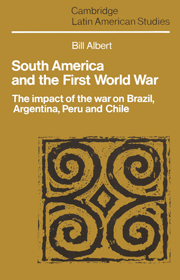Book contents
- Frontmatter
- Contents
- Tables
- Acknowledgments
- Introduction
- 1 Before the War
- 2 The early impact of the War
- 3 The recovery of trade during the War
- 4 Seeking financial solutions
- 5 The War and the growth of manufacturing industry
- 6 The War and the workers
- 7 After the War
- Notes
- Bibliography
- Index
- CAMBRIDGE LATIN AMERICAN STUDIES
7 - After the War
Published online by Cambridge University Press: 22 October 2009
- Frontmatter
- Contents
- Tables
- Acknowledgments
- Introduction
- 1 Before the War
- 2 The early impact of the War
- 3 The recovery of trade during the War
- 4 Seeking financial solutions
- 5 The War and the growth of manufacturing industry
- 6 The War and the workers
- 7 After the War
- Notes
- Bibliography
- Index
- CAMBRIDGE LATIN AMERICAN STUDIES
Summary
If in the early 1920s James Bryce had retraced his steps through Latin America what major changes would he have noticed in the four countries he first visited right before the First World War? Had the years of conflict made any real difference to the political, social or economic life of the republics? Of course, in most respects the pattern of life for most of the people remained essentially the same. The massive inequality and grinding poverty, as well as the excessive degree of export and import dependence, had, if anything, probably become more acute because of the war. The keen-eyed Bryce would, however, have observed a number of major changes, changes which were to become of increasing importance for the region. Being British, he would have been painfully aware that the North American accent was now far more evident among the foreign communities and there were many more goods from the United States in the shops. Britain's prewar anxiety over German competition was being replaced by concern about the impact of US trade and investment. He would also have been forced to notice a very radical shift in the political climate in all the republics. No longer was elite domination to be taken for granted. The working class had revolted, the urban middle class was now more vocal and there was a greatly increased concern about the political ramifications of the “social question.” Not only were political concerns very different, but the elites' fervent embrace of both the world division of labor and European ideas and culture, so apparent before the war, was beginning to loosen.
- Type
- Chapter
- Information
- South America and the First World WarThe Impact of the War on Brazil, Argentina, Peru and Chile, pp. 306 - 321Publisher: Cambridge University PressPrint publication year: 1988

